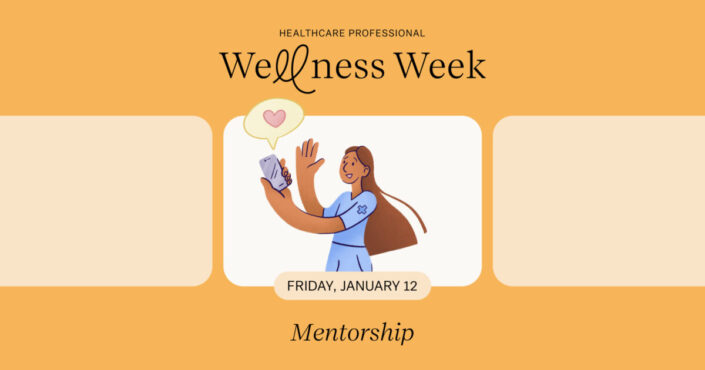Finding someone to help guide you as a mentor can offer your healthcare career a variety of benefits. A knowledgeable mentor can help you learn new patient care skills, navigate bureaucracies, discover and pursue pathways for advancement and ultimately achieve your dream career. However, finding a nurse mentor or a mentor in an allied health profession can seem daunting. If you’re seeking or considering a mentorship in healthcare to help guide your career, read on.
Why Should You Seek a Healthcare Mentorship?
Early in your career is an excellent time to seek the ongoing support of a mentor, whether you’re a nurse or an allied health professional. Although it’s more common for beginning healthcare professionals (HCPs) to seek out a mentor, even experienced nurses and other HCPs can benefit from a mentor/mentee relationship when transitioning to advanced practice or a new specialty, moving up the leadership ladder or simply wanting to learn from a more experienced healthcare professional.
Recent years have been stressful and fatiguing for healthcare professionals. A mentor can provide a caring ear and be a valuable sounding board for coping with work challenges, offloading stress and dealing with patients and their families.
We are also in a period of significant HCP turnover where Vivian’s annual healthcare workforce surveys often unearth a higher-than-expected percentage of HCPs saying they plan to leave their fields. This potential “changing of the guards” could create unprecedented opportunities for career advancement in the coming years.
Having a mentor can help HCPs identify potential pathways to advancement and stay alert to new job openings. Mentors can also help you identify areas of improvement to make you a more qualified candidate for such openings.
What You Can Get Out of a Mentor-Mentee Relationship

Ideally, a mentor-mentee relationship is built over time and lasts many years. It differs from coaching, a more short-term relationship in which you’re assigned a coach to help you work on a specific skill. Mentors provide a more holistic style of informal support in several potential areas. Mentors can:
- Share advice to help you avoid making career mistakes.
- Help you navigate complex bureaucratic systems or the politics of your place of work.
- Steer you toward opportunities for advancement or continuing education.
- Be your advocate when seeking more responsibility or leadership positions.
- Expand your professional network through introductions.
- Teach you valuable additional skills beyond those from your formal training.
- Support you in coping with challenges, improving your mental health and relieving stress.
RELATED: 5 Benefits of a Mentorship in Nursing
Being a Good Mentee Starts with Knowing What You Want
It’s helpful to know what you want out of your career first to be a good mentee and identify a practical choice of mentor. With a desired career destination in mind, it’s easier for your mentor to advise you on how to get to where you want to be.
As a new nurse or allied health provider graduate, you need not rush out and find a mentor in the first year. Take some time first to learn more about what kind of provider you want to be. If you haven’t already set your heart on a particular career track, you might first try rotations in several different units or healthcare settings.
After exploring various units or specialties for some time, ask yourself key questions, such as:
- Where would I like to be in my career in five years?
- Is there a particular degree, field or specialty I’d like to progress to (Master’s Degree or other advanced degree, specialty license, management position, etc.), and are there potential mentors who’ve achieved similar goals?
- Is there a particular care setting (out-patient, hospital, government/municipal facility) or environment (rural, suburban, large-urban) that I’d like to work in?
- Is there a particular salary range I’m targeting for my career, and what kind of roles would enable me to achieve it?
- What would I like the last stage of my career to look like, and do I know someone who works in such a position that I’m seeking to emulate?
You should think of your potential mentor as someone you’d be proud to become in the future, who’s risen to a level you aspire to achieve in the field of your long-term interest.
Five Tips for Finding a Good Mentorship in Healthcare

1. Seek a Match for Your Scope and Expertise
A good mentor should have extensive experience in areas where you wish to build expertise. For instance, if you’re a nurse in a particular specialty, a good mentor might include a charge nurse or nurse manager from your unit. The scope of care between fields can vary markedly, such as a geriatrics nurse compared to an ER nurse. Thus, choosing a mentor in your field offers better guidance. A veteran within your field is familiar with more aspects of patient care and managing career advancement steps and opportunities in that specific field.
A doctor in your field could be a potential mentor regarding patient care for some specialty nurses, like a first assistant, nurse anesthetist or psychiatric nurse, and some allied health professionals like radiology technicians. Alternatively, someone in your same career track might be a better mentor in areas like career advancement.
2. Think Location, Location, Location
Your mentor should work nearby, at least in the same region as you work. Ideally, they should work in the same facility or health system or even in the same unit. Proximity means more immediate access, allowing you to have in-person check-ins with your mentor throughout the year. Patient care can also differ markedly between, say, a rural and urban setting. Therefore, a local mentor may better guide you regarding your area’s patient needs.
If you’re fortunate enough to find a mentor who works for the same employer as you, they should know the ins and outs of the relevant human resources policies and bureaucracy. They would also be more attuned to opportunities that might arise at your workplace or in the region.
3. Reflect on Your Personal Values
To find the right mentor, it can be helpful first to assess your values. Do you aspire to be someone known as a master of technical expertise? Is sociability or bedside manner the area where you want to excel? Do you most want your administrative skills and management acumen to be appreciated? Consider who embodies the skills you most value. Who do you admire in your field? Whose approach to the job inspires you? What sense of work ethic and principles do you respect? In this arena, listen to your heart and intuition to find an ideal match.
4. Explore Formal Mentorship Programs
Some health systems and national non-profits have established formalized mentorship programs to pair potential HCP mentees and mentors nationwide. You can check with your facility’s human resources department to see if it offers an official internal program or partners with any externally. Consider asking your colleagues about any programs that may have benefited them in finding a mentor.
If you don’t have access to a program that works with your health system, Vivian Health set up a mentor-mentee match program during its inaugural Healthcare Professional Wellness Week. Aspiring mentees can share their discipline, specialty and other qualities important in a mentor, and Vivian matches you with a mentor who aligns with your preferences. However, once Vivian puts you and your mentor in touch, it’s up to you to cultivate that relationship.
5. Open Yourself to Informal Guidance
In any relationship, it helps to recognize that we don’t just need someone who’s a good fit for us. The relationship only thrives when we’re also a good fit for them. Potential mentors often send signals of their interest in developing a relationship by offering informal guidance and support before you more formally request a mentorship with them.
HCPs have told Vivian stories of what led to their career advancement, and it sometimes involves letting higher-ups in your organization know where you want to be and what you hope to achieve. Sometimes, sharing this information can lead admins and advanced practitioners to step up and share guidance with you, which can develop over time into a mentorship.
Being a Good Mentee Means Being Open to Change
Finding a good mentor is only where this relationship begins. Its ultimate success relies on your openness to hear the mentor’s suggestions and recommendations and show appreciation for them. It also calls for your willingness to change your behaviors as needed and apply your mentor’s lessons, taking in their ongoing feedback over multiple years.
Explore Vivian’s new program to get matched with a mentor and find the guidance you seek today!









